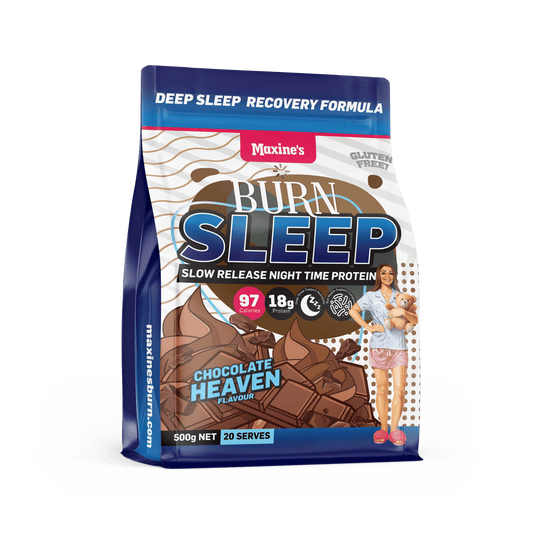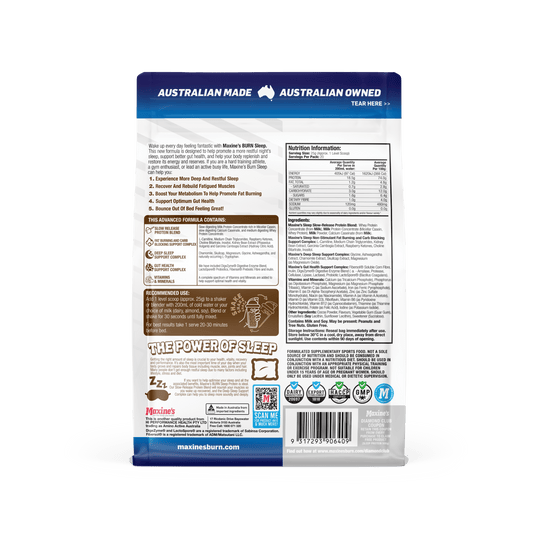A TASTY, NIGHT TIME PROTEIN POWDER YOU CAN COUNT ON FOR MUSCLE GROWTH AND RECOVERY!
Do you often feel famished after a workout or wake up in the morning absolutely starving?
Night time protein powder can support muscle recovery by providing essential amino acids and nutrients needed for muscle repair and growth during rest periods, such as sleep. If so, our Burn Sleep Protein might just be your new best friend! It’s a powerful supplement supporting muscle growth, enhancing recovery, and even aiding weight loss. By consuming slow-releasing protein at the right time and in the right amounts, you can maximise its benefits and support your health and fitness goals.
Shop Maxine's night time protein powder online available in various delicious flavours, like chocolate mousse, vanilla, salted caramel, and custard.
WHAT IS NIGHT TIME PROTEIN?
Night time protein (also known as slow-release protein) is a type of protein that is digested and absorbed into the body at a slower rate. This provides a sustained flow of amino acids (essential for muscle repair and growth) over a longer period.
The primary source of slow-release protein is casein. Derived from milk, casein forms a gel-like substance in your stomach upon consumption slowing down the rate of digestion. This results in the gradual, continuous release of essential amino acids into the bloodstream over several hours. This makes casein an excellent example of a slow-digesting protein, ideal for muscle recovery during sleep and maintaining a positive protein balance.
What does this mean?
Fewer hunger pangs, better muscle recovery, and more successful weight loss/management.
UNDERSTANDING PROTEIN AND MUSCLE GROWTH
What is Muscle Protein Synthesis?
Muscle protein synthesis (MPS) is the process by which your body builds new muscle proteins to repair and grow muscle tissue. When you consume protein, your body breaks it down into amino acids, which are then used to create new muscle proteins. This process is crucial for muscle growth, repair, and maintenance. Essentially, MPS is the body’s way of rebuilding and strengthening muscles after they have been broken down during exercise. By ensuring a steady supply of amino acids through your diet, you can support continuous muscle protein synthesis, leading to enhanced muscle growth and recovery.
The Role of Amino Acids in Muscle Growth
Amino acids are the building blocks of protein and play a vital role in muscle growth. There are 20 different amino acids that your body uses to build proteins, and nine of them are essential amino acids (EAAs) that your body cannot produce on its own. These EAAs, such as leucine, isoleucine, and valine, are particularly important for muscle growth and recovery. When you consume protein, your body uses these amino acids to build new muscle proteins, which help to promote muscle growth and repair. Ensuring you get enough EAAs in your diet is key to supporting muscle protein synthesis and achieving your muscle growth goals.
HOW TO INCORPORATE NIGHT TIME PROTEIN INTO YOUR DIET
Introducing night time protein powder into your diet is relatively easy! It’s all about choosing the right time and amount of protein for your nutritional needs (we recommend following the protein intake guidelines on the back of our packaging). These proteins are particularly important as they help prevent muscle breakdown during sleep by providing a continuous supply of amino acids.
The best times for slow-release casein protein powder include:
-
Before Bed — Consuming night time protein powder before bed can provide your muscles with a steady supply of amino acids throughout the night.
-
Between Meals — A protein shake between meals can help keep hunger at bay and provide a continuous supply of amino acids to your muscles.
- Post-Workout — While fast-absorbing casein protein like whey is typically recommended post-workout, slow-release protein can also help prolong muscle repair and growth. Paired with exercise, this protein can help stimulate muscle protein synthesis, leading to greater muscle growth and recovery.
THE BENEFITS OF TAKING PROTEIN AT NIGHT
Incorporating protein into your diet before bed can offer numerous benefits, including:
- Promoting muscle growth and recovery
- Reducing muscle soreness and inflammation
- Improving sleep quality
- Supporting muscle repair and maintenance
Taking protein before bed can be a valuable addition to your fitness routine, helping to promote muscle growth and recovery while you sleep.
HOW LONG BEFORE BED SHOULD I TAKE PROTEIN?
Taking slow release protein powder before bed can be highly beneficial for muscle growth and recovery. While the optimal time to consume protein before bed is still debated, research suggests that consuming protein 1-3 hours before sleep can be effective. This timing allows your body to digest and absorb the protein, providing a slow release of amino acids into your bloodstream throughout the night. This steady supply of amino acids can help promote muscle recovery and growth during sleep, a critical time when your body is in a state of repair and rebuilding.
The type of protein you consume before bed also matters. Slow-release proteins, such as casein protein, provide a sustained release of amino acids over several hours, making them an excellent choice for nighttime consumption. In contrast, whey protein is a fast-digesting protein that delivers a rapid release of amino acids, making it more suitable for post-workout recovery.
WHY CHOOSE MAXINE'S BURN?
Carbs and healthy fats are important for energy, but protein is crucial for muscle growth and tissue repair — that’s why our Australian-based team of sports scientists and food technologists are always searching for effective ingredients like whey protein concentrate, production techniques, and creative new recipes (including gluten-free and plant-based proteins) to pass onto our customers.
Whether you’re a professional athlete, a gym junkie, or simply an active woman on the go, we’re dedicated to supplying the tailored supplements you need to build muscle mass, improve body composition, stay healthy, and keep energy levels high.
FAQS ABOUT NIGHT TIME CASEIN PROTEIN POWDER
WHAT'S THE DIFFERENCE BETWEEN CASEIN AND WHEY PROTEIN?
There are several differences between casein and whey. For example, casein is derived from milk and accounts for about 80% of the protein content in cow's milk. Whey protein is also derived from milk, specifically as a by-product of cheese-making. It constitutes the remaining 20% of the protein in milk.
Casein is also a slow-digesting protein source (ideal for amino acids at night), whereas whey protein is fast-digesting (ideal for post-workout recovery).
DO SLOW-RELEASING PROTEINS HAVE ANY IMPACT ON OVERNIGHT MUSCLE RECOVERY?
Yes, consuming slow-releasing proteins before bed can support muscle recovery by providing a prolonged supply of amino acids, preventing muscle breakdown during sleep. It can also help reduce muscle soreness by supplying the essential building blocks required for muscle tissue repair and growth.
CAN MAXINE'S SLOW-RELEASING PROTEINS BE USED AS MEAL REPLACEMENTS?
Yes, our slow-releasing proteins can be used as part of a meal replacement strategy thanks to their ability to promote satiety and provide a sustained release of amino acids, mimicking the effects of a balanced meal.
CAN SLOW-RELEASING PROTEINS BE USED AS PART OF A PRE-WORKOUT NUTRITION STRATEGY?
While fast-digesting proteins are typically recommended before a workout, incorporating slow-releasing proteins in a pre-workout meal can help provide a sustained source of energy for longer workouts.
IS MAXINE'S NIGHT TIME PROTEIN VEGAN?
Unfortunately, this product is not vegan. Our night time protein and slow release protein powder is made using micellar casein, derived from milk.









